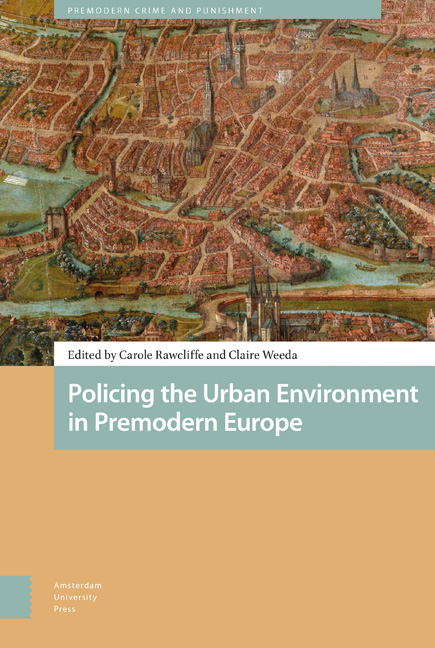Book contents
- Frontmatter
- Contents
- List of Illustrations
- List of Figures and Charts
- Introduction
- 1 Cleanliness, Civility, and the City in Medieval Ideals and Scripts
- 2 The View from the Streets: The Records of Hundred and Leet Courts as a Source for Sanitary Policing in Late Medieval English Towns
- 3 Urban Viarii and the Prosecution of Public Health Offenders in Late Medieval Italy
- 4 Food Offenders: Public Health and the Marketplace in the Late Medieval Low Countries
- 5 Policing the Environment of Late Medieval Dordrecht
- 6 Muddy Waters in Medieval Montpellier
- 7 Regulating Water Sources in the Towns and Cities of Late Medieval Normandy
- 8 Policing the Environment in Premodern Imperial Cities and Towns: A Preliminary Approach
- 9 Official Objectives of theVisitatio Leprosorum: Ambiguity, Ambivalence, and Variance
- Index
1 - Cleanliness, Civility, and the City in Medieval Ideals and Scripts
Published online by Cambridge University Press: 21 November 2020
- Frontmatter
- Contents
- List of Illustrations
- List of Figures and Charts
- Introduction
- 1 Cleanliness, Civility, and the City in Medieval Ideals and Scripts
- 2 The View from the Streets: The Records of Hundred and Leet Courts as a Source for Sanitary Policing in Late Medieval English Towns
- 3 Urban Viarii and the Prosecution of Public Health Offenders in Late Medieval Italy
- 4 Food Offenders: Public Health and the Marketplace in the Late Medieval Low Countries
- 5 Policing the Environment of Late Medieval Dordrecht
- 6 Muddy Waters in Medieval Montpellier
- 7 Regulating Water Sources in the Towns and Cities of Late Medieval Normandy
- 8 Policing the Environment in Premodern Imperial Cities and Towns: A Preliminary Approach
- 9 Official Objectives of theVisitatio Leprosorum: Ambiguity, Ambivalence, and Variance
- Index
Summary
Abstract
Latin and vernacular urban panegyrics, describing the ideal city and its residents, mushroomed in the twelfth century. Painting a utopian view of the city that mirrors the heavenly Jerusalem, they rhetorically conveyed ideals of urbanity for aspiring members of the body politic to emulate. This chapter explores the ways in which the cityscape constructed in these texts, and residents’ behaviour (as influenced by conduct manuals and regimes of health), appear embedded in a natural environment reflected through the lens of Galenic medicine. Evoking the benefits of cleanliness and beauty, these concepts of health and hygiene accorded closely with issues of social status. The disciplined quest for moderation and balance offered spiritual and physical health, as well as enhanced personal repute.
Key words: Galenic medicine; panegyrics; urbanity; habitus; hygiene
Florence's salubriousness in Leonardo Bruni's Laudatio Florentinae urbis, written about 1404, stands in stark contrast to today's image of the medieval city as a place mired in filth. Ideally situated between mountains and a valley, the city was shielded from the bitterly cold northern winds and the corrupt air that festered in the damp and dreary vale. Beneath a canopy of fresh air, the circuit of well-maintained walls enveloped a majestic cityscape of palaces and churches, ancient and modern. Above all, Florence surpassed all other cities in its cleanliness, for ‘you will find here nothing that is disgusting to the eye, offensive to the nose, or filthy under foot. The great diligence of its inhabitants ensures and provides that all filth is removed from the streets, so you see only what brings pleasure and joy to the senses.’ Sanitation penetrated the very pores of the city, purging the nooks and crannies of the household interiors of the poor and the rich, as well as sweeping clean the broad, paved streets where crowds gathered. Refuse produced at night was not left lying about in the streets, as in other cities, but removed directly. Perambulation of the city was further facilitated through the channelling of rain water in gutters, thereby ensuring that pedestrians had dry feet.
- Type
- Chapter
- Information
- Policing the Urban Environment in Premodern Europe , pp. 39 - 68Publisher: Amsterdam University PressPrint publication year: 2019



